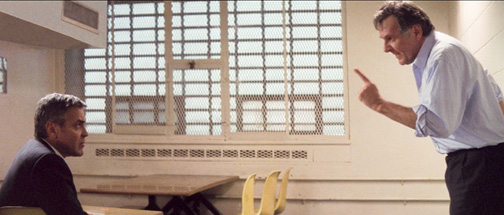Movie Review: Michael Clayton
By Eric Hughes
October 15, 2007
BoxOfficeProphets.com

Yet, believable may hardly be the word to describe the sharp stable of actors that writer and director Tony Gilroy assembled to tell his rich story of deceit and lies. It's Academy Award winner George Clooney, Golden Globe nominee Tom Wilkinson and Golden Globe nominee Tilda Swinton, who has put together quite the film resume as of late, including star turns in Adaptation, Broken Flowers and The Chronicles of Narnia: The Lion, the Witch and the Wardrobe.
In this one, Clooney plays title character Michael Clayton, a self-proclaimed "fixer," or better yet, janitorial lawyer for law firm Kenner, Bach & Ledeen. Basically, Michael is the go-to man to enter any sticky legal situation, no matter how unpleasant, and get the job done, whatever it takes. Though he hates his job, Michael is paid splendidly and is quite good at what he does. The best, actually, according to boss Marty Bach (Pollack). But things turn rather ugly when Michael's friend and fellow lawyer, Arthur Edens (Wilkinson), goes nutso and threatens to publicize sneering evidence against one of the firm's biggest clients, United Northern. While the company's chief executive, Karen Crowder (Tilda Swinton), chances at silencing Arthur, Marty orders Michael to step into the arena and do anything in his power to clean up Arthur's mess.
The film may cause some confusion at its beginning, with Arthur leaving a menacing, drawn out message for Michael, yet neither character appears on screen. The camera then swoops into the firm's main office, where dozens of lawyers are scampering around frantically for reasons unknown. And Marty, on his cell with a journalist from the Wall Street Journal, chooses his words rather carefully in an effort to conceal why his mice are scurrying so quickly. Then Michael finally appears. He helps a client, barely, takes a country road excursion, discovers horses and escapes his car's detonation. Again, for reason's unknown. Then we flash back a few days - a wrap-around framing device has been used.
It's this kind of sophisticated narrative that the film thrives on. This is not to say it's confusing, because it isn't. It is merely Gilroy's way to weed out those that want to watch the film and pay attention, and those that don't. Remember, this is an intellectual thriller, not a primitive, every day one.
The film is well acted and is really quite beautiful. Blues, blacks and grays dominate the frame, and the skies are oftentimes ominous and dreary. It is, for sure, a testament to the film's encompassing theme of corrupt businessmen and profit practices among the major corporations. Of course, it isn't the most original of premises, it's been done time and time again. But Michael Clayton had an authoritative quality to it. And its mature dialogue and intense, satisfying conclusion further prove that point. The film is unlikely to be a breakout hit. But it certainly will delight those deemed ready to take on this slow, but powerful ride.